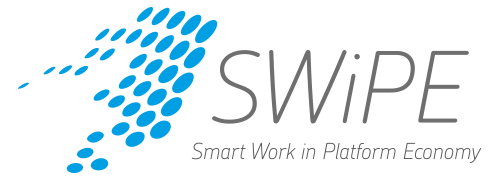
Agile achievers are smart workers in the platform economy age. They have many followers on social media and are asked to impart the secrets of their success. They have tied their own skills and capital to digital marketplaces. Take for example the Finnish mother who invented a new type of baby mattress; an innovation that helps babies fall asleep in minutes. Leveraging digital marketing the mattress that addresses difficulties in falling asleep can spread across the world helping families with young children. How about the traveller from Tampere who, in a train toilet, came up with an idea for a social platform for consumer complaints? Both the passenger from Tampere and the Finnish stay-at-home mom were able to collect significant funding from experienced investors in order to develop their businesses. They are true inventors of work. The same logic and revenue model can be applied to the creation of platforms that are based on real-time information sharing and interfaces.
The agile achiever is not necessarily a full time employee enjoying a long career in the service of one employer. They might, for example, be dividing their time. Part time gig work may exist alongside a permanent contract or one’s home might be filled on occasion with travellers passing through. Entrepreneur-employees are transcending traditional employment patterns.
Merging a full-time career and a side job in such a way that the one does not eat into the other can be a challenge. Vacation from one may refer to work in the other. There are also people who prioritise their vacation to the extent that gig work is necessary in the hunt for more earnings. Entrepreneur-employees need to organise their work well so that they might survive the long winter.
Experts tell us that we need to give one hundred and fifty percent in work. High achievers also want the freedom to develop their own interests. Would employees be ready to give even one hundred percent, if they do not make enough from gig work to fulfil their holiday dreams or follow their passions? Enthusiasm fuels enthusiasm. A side gig may make workers more efficient in their primary occupations.
A hobby might also be an integral part of work and work might be a great source of inspiration. Musicians, fashion designers, and lifestyle coaches definitely make hobbies of their jobs. Employee abilities may be underutilized in many areas, indeed independent digital platform work can be an interesting option for ambitious hobbyists.
Inventors of new work and platform crafters do not seek to become employees. Generalists grasp new job opportunities and identify new possibilities – in the train toilet, for example. Work experience from the Police Polytechnic, an NGO or with the Finnish scouts can become a pathway to entrepreneurship; such as for Minna Rantama who has launched the new Kumous-job search service.
Crafters of their own work are far from the depressed and bored Inkeri sighing “why does everything always have to change?”
About the author: Sari Käpykangas works as a research scientist at the Finnish Institute of Occupational Health. She holds a master’s degree in of social sciences and is a social psychologist.
Read more here about Sari’s areas of expertise and work as a researcher.
